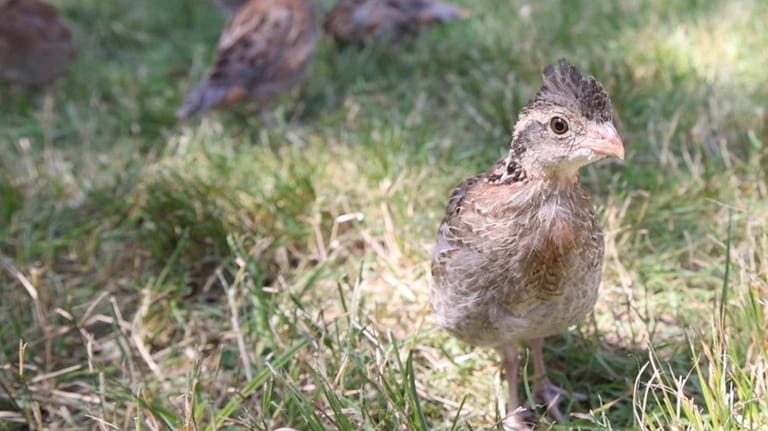North Hempstead releases latest class of quails to munch on ticks

North Hempstead’s population grew by 100 on Tuesday, but the new residents have feathers, and their snack of choice is Long Island’s growing tick population.
For the fifth year, the town has partnered with the Center for Environmental Education and Discovery to release Northern Bobwhite Quails onto the Hempstead Harbor Trail in Port Washington. The number of birds released in a wooded area near North Hempstead Beach Park is double the 2021 count.
“Port Washington welcomes its new 100 residents,” said Councilwoman Mariann Dalimonte, who represents the area.

One of the quails released Tuesday in Port Washington. North Hempstead began using the birds in 2017 to help reduce the tick population. Credit: Howard Schnapp
Eric Powers, a program and site director lead environmental educator with the Brookhaven-based center, said he started the quail program 22 years ago while studying the growth of ticks on Long Island. He said he noticed a decline of Northern Bobwhite Quails, which are a natural predator of ticks, and decided to incubate the birds and release them into the wild to balance the environment.
“The problem is just getting worse and worse, the longer that we have our ecosystem out of balance,” Powers said. “The sooner we can get it back into balance, the sooner we can get this tick situation under control naturally.”
North Hempstead’s program began in 2017 and has become an annual event, except for 2020 because of the COVID-19 pandemic.
In normal conditions, Powers said, the quails have a 20% chance of surviving the winter conditions and reproducing in the warmer months. However, he noted that cats are one of the quails’ most notorious predators, which contributes to the population decline and an increase in the tick population. Since ticks flourish in warm temperatures, climate change may also contribute to an increase, he said.
“With global climate change, we’re seeing an increase in average temperatures, warmer summers and most importantly warmer winters,” he said. “Global climate change is good for ticks and bad for us.”
Powers estimated that in the lifetime of a quail, which is about three years, it can consume as many as 10,000 ticks, which can carry many pathogens, including a bacterium that causes Lyme disease. In 2019, the most recent data from the Atlanta-based Centers for Disease Control and Prevention, state and local health departments across the country reported 50,865 cases of tick-borne disease, including nearly 35,000 Lyme disease cases.
“We’re all learning a lot about how we can improve our environment in a safe way, nontoxic, and to keep us all safe this summer,” Supervisor Jennifer DeSena said.
Powers said volunteers from several school districts and libraries incubated and nurtured the birds until they were ready to be freed.
“Now, they have graduated flight school and they are ready to embark [on] their own lives here in the Town of North Hempstead,” Powers said.
Sentencing in murder of 5-year-old ... Israel-Hamas war protest at SBU ... Tourism building demolition ... Dome shaped home
Sentencing in murder of 5-year-old ... Israel-Hamas war protest at SBU ... Tourism building demolition ... Dome shaped home
